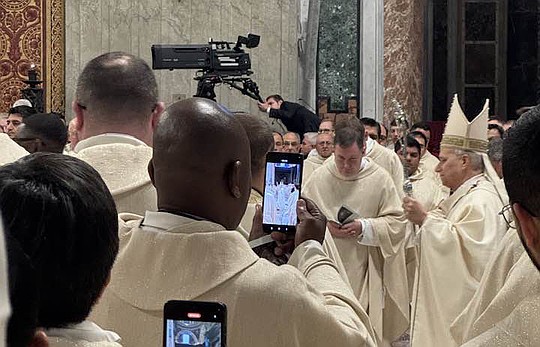Second Sunday of Advent: John the Baptist tells of ‘more to come’
December 8, 2023 at 6:00 p.m.

John the Baptist is truly a remarkably important figure in the story of Advent and beyond. As a prophet and preacher, he is the end of the Old Testament and the beginning of the New.
St. Mark’s Gospel, proclaimed on the first and second Sundays of Advent, is the considered the earliest of the four Gospels written. And yet, it does not contain any specific reference to the story of the birth of the Lord Jesus Christ in Bethlehem. For that, we need to read the first chapters of the Gospels of St. Matthew (1:1-2:23) and St. Luke (1:5-2:52), what Scripture scholars commonly describe as the “infancy narratives.”
St. Mark’s Gospel begins by introducing us to St. John the Baptist, foretold by the Old Testament prophet Isaiah as the precursor of the Messiah:
“As it is written in Isaiah the prophet: ‘Behold, I am sending my messenger ahead of you; he will prepare your way. A voice of one crying out in the desert: “Prepare the way of the Lord, make straight his paths.” John the Baptist appeared in the desert proclaiming a baptism of repentance for the forgiveness of sins.’”
His presence and preaching drew quite a crowd. St. Mark writes,
“People of the whole Judean countryside and all the inhabitants of Jerusalem were going out to him and were being baptized by him in the Jordan River as they acknowledged their sins.”
St. John makes a curious reference to the “advent” of the Messiah when he proclaims,
“One mightier than I is coming after me. I am not worthy to stoop and loosen the thongs of his sandals. I have baptized you with water; he will baptize you with the Holy Spirit.”
And then, in the next few verses, St. Mark introduces Jesus of Nazareth, already an adult at this point, who presents himself and submits to the baptism of John.
The other three Gospels refer to the testimony of John – Isaiah’s “voice crying out in the desert” – and to Jesus’ baptism in the Jordan, revealing his messianic identity as he begins his public ministry, thirty years after his birth in Bethlehem.
On this second Sunday of Advent, John the Baptist emerges as a prophetic “voice” preparing the way for the Messiah and calling his followers to do the same. “One mightier” than he arrives and turns the pages of the Old Testament prophecies to the New Testament realization that the Messiah has come, and the world would never be the same. The story continues but not before we hear how it all began … what it all means and how it all unfolds.
The star appearing in the Eastern sky over Bethlehem; the home in Nazareth; the hidden years there; the preaching of John the Baptist; the waters of the Jordan; the voice from the heavens, “this is (you are) my beloved Son with whom I am well pleased (Mark 1:11; Matthew 3:17; Luke 3:22).”
So much more to come.
Related Stories
Thursday, January 08, 2026
E-Editions
Events
John the Baptist is truly a remarkably important figure in the story of Advent and beyond. As a prophet and preacher, he is the end of the Old Testament and the beginning of the New.
St. Mark’s Gospel, proclaimed on the first and second Sundays of Advent, is the considered the earliest of the four Gospels written. And yet, it does not contain any specific reference to the story of the birth of the Lord Jesus Christ in Bethlehem. For that, we need to read the first chapters of the Gospels of St. Matthew (1:1-2:23) and St. Luke (1:5-2:52), what Scripture scholars commonly describe as the “infancy narratives.”
St. Mark’s Gospel begins by introducing us to St. John the Baptist, foretold by the Old Testament prophet Isaiah as the precursor of the Messiah:
“As it is written in Isaiah the prophet: ‘Behold, I am sending my messenger ahead of you; he will prepare your way. A voice of one crying out in the desert: “Prepare the way of the Lord, make straight his paths.” John the Baptist appeared in the desert proclaiming a baptism of repentance for the forgiveness of sins.’”
His presence and preaching drew quite a crowd. St. Mark writes,
“People of the whole Judean countryside and all the inhabitants of Jerusalem were going out to him and were being baptized by him in the Jordan River as they acknowledged their sins.”
St. John makes a curious reference to the “advent” of the Messiah when he proclaims,
“One mightier than I is coming after me. I am not worthy to stoop and loosen the thongs of his sandals. I have baptized you with water; he will baptize you with the Holy Spirit.”
And then, in the next few verses, St. Mark introduces Jesus of Nazareth, already an adult at this point, who presents himself and submits to the baptism of John.
The other three Gospels refer to the testimony of John – Isaiah’s “voice crying out in the desert” – and to Jesus’ baptism in the Jordan, revealing his messianic identity as he begins his public ministry, thirty years after his birth in Bethlehem.
On this second Sunday of Advent, John the Baptist emerges as a prophetic “voice” preparing the way for the Messiah and calling his followers to do the same. “One mightier” than he arrives and turns the pages of the Old Testament prophecies to the New Testament realization that the Messiah has come, and the world would never be the same. The story continues but not before we hear how it all began … what it all means and how it all unfolds.
The star appearing in the Eastern sky over Bethlehem; the home in Nazareth; the hidden years there; the preaching of John the Baptist; the waters of the Jordan; the voice from the heavens, “this is (you are) my beloved Son with whom I am well pleased (Mark 1:11; Matthew 3:17; Luke 3:22).”
So much more to come.











